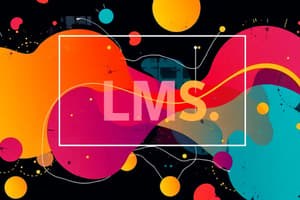Podcast
Questions and Answers
What is the main purpose of educational platforms?
What is the main purpose of educational platforms?
- To restrict access to educational content
- To limit educational content to a select few
- To complicate the delivery of educational content
- To make educational content accessible to anyone with an internet connection (correct)
Which type of educational platform combines features of both LDS and LMS?
Which type of educational platform combines features of both LDS and LMS?
- Learning Destination Sites (LDS)
- One-on-One Learning
- Learning Management Systems (LMS)
- Learning Management Ecosystems (LME) (correct)
What distinguishes Learning Management Systems (LMS) from Learning Destination Sites (LDS)?
What distinguishes Learning Management Systems (LMS) from Learning Destination Sites (LDS)?
- LDS are used by corporations and organizations
- LMS are not accessible online
- LMS are software systems used for learning and training (correct)
- LMS aggregate courses from various providers
Which type of educational platform involves direct interaction between students and teachers?
Which type of educational platform involves direct interaction between students and teachers?
What is a characteristic of Video-Based Learning?
What is a characteristic of Video-Based Learning?
Which type of educational platform can only be accessed by individuals within a specific organization?
Which type of educational platform can only be accessed by individuals within a specific organization?
What type of learning experience does Group Learning offer?
What type of learning experience does Group Learning offer?
Which of the following is a benefit of educational platforms?
Which of the following is a benefit of educational platforms?
What is a challenge mentioned in the text regarding educational platforms?
What is a challenge mentioned in the text regarding educational platforms?
What must users evaluate when choosing an educational platform?
What must users evaluate when choosing an educational platform?
How can learners achieve academic success while using educational platforms?
How can learners achieve academic success while using educational platforms?
What is a key benefit of educational platforms in terms of accessibility?
What is a key benefit of educational platforms in terms of accessibility?
Flashcards are hidden until you start studying
Study Notes
Introduction to Educational Platforms
An educational platform is a digital tool designed to facilitate the delivery of educational content, making it accessible to anyone with an internet connection. These platforms have gained prominence since the COVID-19 pandemic, allowing students worldwide to access education remotely. They come in various forms, catering to different needs and preferences.
Different Types of Educational Platforms
There are several categories of educational platforms:
-
Learning Destination Sites (LDS): These platforms aggregate courses across various providers. Examples include Coursera, Udemy, and Codecademy.
-
Learning Management Systems (LMS): These are software systems used by corporations and organizations for learning and training. They're not standalone websites and can be accessed online or as installed software, and can be paid or open-source. Popular examples are Blackboard and Canvas.
-
Learning Management Ecosystems (LME): These combine features of LDS and LMS, and are internal to specific organizations, meaning you can't access them unless you're part of the organization.
-
Video-Based Learning: This delivery method involves learning from videos or video series, offering flexibility and the ability to learn anytime, anywhere.
-
One-on-One Learning: Provides direct interaction between students and teachers through live tutorials or web meetings.
-
Group Learning: Offers synchronous learning experiences, such as virtual classrooms, where students interact in real-time.
Benefits of Educational Platforms
Educational platforms offer numerous benefits:
- Flexibility: Users can access and absorb educational content at their convenience.
- Cost-Effectiveness: Many platforms offer affordable or free educational material.
- Wide Selection: Platforms provide a diverse range of courses, from basic to advanced levels, covering various subjects.
- Accessibility: Users can study from anywhere with an internet connection, eliminating geographical barriers.
Challenges and Considerations
While educational platforms offer many benefits, challenges remain, such as ensuring user authentication and maintaining data privacy. Additionally, users must evaluate platforms based on their needs, budget, and learning styles.
In summary, educational platforms offer a versatile solution to remote learning, meeting diverse needs and preferences. By leveraging these platforms strategically, learners can achieve academic success while balancing work and life commitments.
Studying That Suits You
Use AI to generate personalized quizzes and flashcards to suit your learning preferences.




